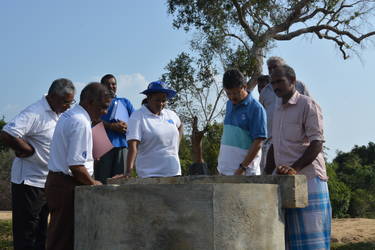Rehabilitated Pookulum Tank unleashes the latent potentials of the Thevipuram village
“I am 63 years old. This is the second worst drought that I have experienced in my life time. The first one was in 1973 and this one in 2014. If our tank had not been rehabilitated, we would have gone through untold hardships. We had very good paddy cultivation this Maha thanks to FAO and EU. Before the tank was rehabilitated our wells had salty water. Now we get fresh water from our wells even in this season of drought due to the rehabilitation of the tank. We can even irrigate our home gardens now using agro-wells. I feel comfortable that my family has enough rice to eat until the next cultivation season.
I express my gratitude to FAO and EU on behalf of the members of Thevipuram B Farmers Organization” said Mr Kandaiya Krishnapillai, The President of the Farmer Organization.
The Pookulum tank was breached during the 2008 monsoon rains and thereon abandoned due to the war. FAO, with the EU supported project ‘Integrated Irrigation and Agricultural Livelihood Development in Kilinochchi and Mulaitivu Districts’ rehabilitated the tank adopting participatory irrigation management approaches. The tank bund, a new sluice gate spillway and supply irrigation channels were rehabilitated by the project. Upon completion of work, the tank spilled in January 2014 benefitting the villagers of Thevipuram.
Over 50 farmers planted a total of 160 acres of paddy. Sixty acres were under full rain-fed and the balance was irrigated from the Pookulum tank. Apart from boosting the agricultural productivity, there are many other spillover effects of the rehabilitated tank in the economic, social and environmental spheres.
More than 100 families in the village are benefiting due to the recharge of both agro and domestic wells. Before the tank was rehabilitated the ground water had become saline and was neither suitable for drinking nor irrigating.Around 1 250 cattle and buffaloes of Thevipuram and another 1 000 cattle from adjoining villages are using the tank for drinking and wallowing. The livestock owners are benefitted and the village is provided with essential proteins in return. With the rehabilitation of the tank, farmers have diverted the spill water into a pond in the jungle cultivating 10 acres of banana. The farmer organizations have decided to cultivate groundnuts during the upcoming 2014 Yala season.

